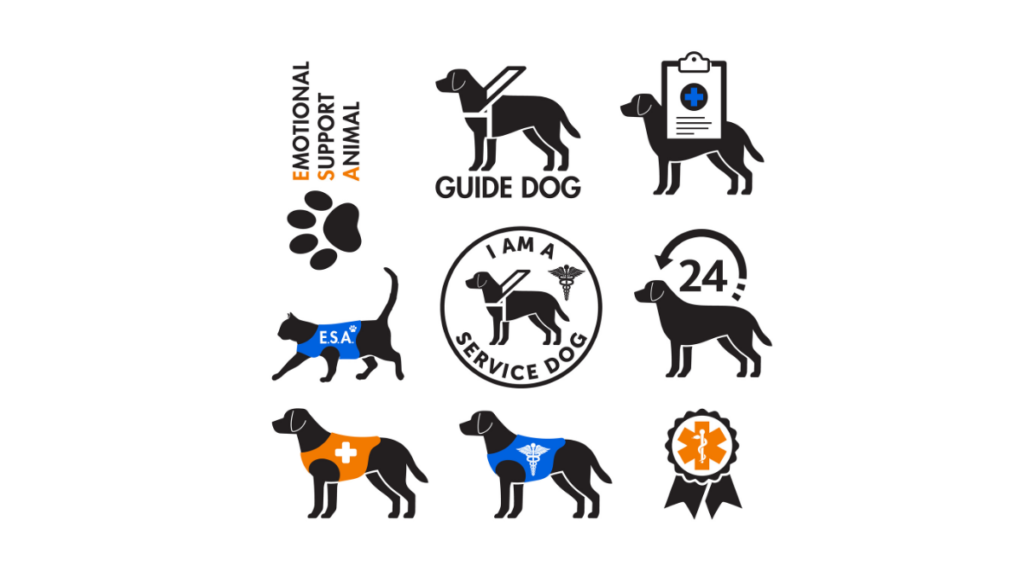Josh and his team proved their track record. I hired him at 9am and they appeared for me by 1pm the same day. Highly contested paternity case, turned dependency nightmare. He faught hard in a short time and got the results I needed. My baby back. Josh and his associates are kind, patient, diligent and aggressive. They are human. I trusted them through the whole process. I was kept informed and they faught with passion. I’d rehire josh and his team any day. It was well worth the money spent. – Rochelle

How Service Animals and Emotional Support Dogs in Florida Apply to Divorce and Ownership Disputes
In a previous article, we discussed what happens to pets in divorce. Because divorces can result in relocation for one or both parties, we believe that our clients and followers would benefit from an article concerning service dogs and emotional support animals (ESA) in Florida.
SERVICE ANIMALS
The state of Florida as well as federal laws and regulations (Americans with Disabilities Act or ADA) provide protections for individuals with disabilities from discrimination in the use of service animals. The Florida Statute, Section 413.08 covers animals that are trained to do work or perform tasks for a person with a physical mental psychiatric sensory or intellectual disability. Physically disabled is defined under the law as any person who has a physical impairment that substantially limits one or more major life activities. Generally, this definition is interpreted broadly and can cover a wide variety of impairments.
EMOTIONAL SUPPORT ANIMALS
Effective July 1, 2020, Florida Statute Section 760.27 prohibits discrimination in housing provided to persons with a disability or disability-related need for an emotional support animal (ESA). Under the statute, an ESA is defined as an animal that does not require training to do work, perform tasks, provide assistance, or provide therapeutic emotional support by virtue of its presence which alleviates one or more identified symptoms or effects of a person’s disability.
This act covers any housing provider who engages in conduct covered by the federal Fair Housing Act or s. 504 of the Rehabilitation Act of 1973, including the owner or lessor of a dwelling.
The law makes it unlawful to discriminate in the provision of housing to a person with a disability or disability-related need for an ESA..
A disabled person is permitted to keep their ESA as a reasonable accommodation in housing. There can be no extra fee charged for an ESA.
Like Section 413.08, a housing provider may prohibit any animal that poses a direct threat of physical damage to property or others, and that the threat cannot be mitigated by another reasonable accommodation.
Unlike Section 4131.08, if a disability is not readily apparent, a housing provider may request supporting information such as:
A service animal is defined as an animal that is trained to perform tasks for an individual with a disability. The tasks may include, but are not limited to, guiding a person who is visually impaired or blind, alerting a person who is deaf or hard of hearing, pulling a wheelchair, assisting with mobility or balance, alerting and protecting a person who is having a seizure, retrieving objects, or performing other special tasks. A service animal is not a pet.
Under the law persons with disabilities are protected from discrimination in public accommodations including hotels other lodging establishments, public transportation, depots, and stations, restaurants, sales or rental establishments, service establishments, public gatherings, auditoriums, conventions centers, theaters, sports stadiums, gyms, bowling alleys, recreational facilities, zoos, parks, libraries, museums, educational institutions, and social service centers.
You can’t be charged extra by any public accommodation but you must be able to keep your animal under control. You cannot be required to prove your animal is trained, nor can any establishment ask you about your disability. You can be asked whether your animal is a service animal necessary for your disability and about the work the animal has been trained to perform. However, if your animal poses a direct threat to the health or safety or others it may be excluded.
Persons with disabilities with service dogs are entitled to full and equal access to housing under Section 413.08. In addition, the federal Fair Housing Act also mandates housing facilities to permit service dogs and emotional support animals If you have a disability-related need for the animal. The animal must work, perform tasks or services, or alleviate the emotional effects of your disability.
- A determination of disability from any state, or local government agency.
- Receipt of disability benefits or services from any state, or local government agency.
- Proof of eligibility for housing assistance or a housing voucher received because of a disability.
- Information from a health care practitioner, as defined in s. 456.001; a telehealth provider, as defined in s. 456.47; or any other similarly licensed or certified practitioner or provider in good standing with his or her profession’s regulatory body in another state but only if such out-of-state practitioner has provided in-person care or services to the tenant on at least one occasion. Such information is reliable if the practitioner or provider has personal knowledge of the person’s disability and is acting within the scope of his or her practice to provide the supporting information.
- Information from any other source that the housing provider reasonably determines to be reliable in accordance with the federal Fair Housing Act and s. 504 of the Rehabilitation Act of 1973.
Furthermore, if a person’s disability-related need for an ESA is not readily apparent, a housing provider may request information that supports the need for the particular emotional support animal being requested which may include:
- Information identifying the particular assistance or therapeutic emotional support provided by the specific animal from a health care practitioner, as defined in s. 456.001; a telehealth provider, as defined in s. 456.47; or any other similarly licensed or certified practitioner or provider in good standing with his or her profession’s regulatory body in another state. Such information is reliable if the practitioner or provider has personal knowledge of the person’s disability and is acting within the scope of his or her practice to provide the supporting information.
- Information from any other source that the housing provider reasonably determines to be reliable in accordance with the federal Fair Housing Act and s. 504 of the Rehabilitation Act of 1973.
If you intend to keep more than one ESA you may be required to provide information to a housing provider upon request regarding the specific need for each animal. A disabled person under the statute must also be able to provide proof of compliance with state and local requirements for licensing and vaccinating each ESA.
However, a housing provider’s right to request information is limited under the statute. A housing provider may not request information that discloses the diagnosis or severity of a person’s disability or any medical records relating to the disability. The housing provider may not require the use a specific form or notarized statement.
In addition, an ESA registration of any kind obtained from the internet does not establish that a person has a disability or disability-related need for an ESA.
The statute also makes a disabled person liable for any damage to the premises by the ESA.
However, Section 760.27 does not apply to a service animal under Section 413.08.

FRAUD
Many people are skeptical about ESAs and are concerned about fraud. The internet is full of outfits that claim to provide documentation sufficient to satisfy the law for a small fee. So in addition to the protections afforded housing providers under Section 413.08 and Section 760.27, the Florida Legislature passed an anti-fraud bill effective July 1, 2020, the same date as Section 760.08, Section 817.265.
That law punishes any person who provides fraudulent information or willfully misrepresents themselves as having a disability or a disability-related need for an ESA. Under Section 817.265 a person can be convicted of a misdemeanor of the second degree and must perform 30 hours of community service for an organization that services disabled persons or other appropriate agency as the court determines.
Health professionals who provide fraudulent information without personal knowledge are subject to disciplinary action under Section 456.072 as of June 23, 2020.

CONCLUSION
If you have beloved pets and need to relocate due to a separation or divorce you may run into the considerable problem of HOA restrictions. However, if you have a legitimate disability, you may qualify under one or both statutes for a service animal or ESA. Many people live with conditions or illnesses that are considered to be disabling to one degree or another without really considering themselves disabled.
The best thing to do is to consult with your regular treating physician or specialist who has personal knowledge about your health and medical history. If after consulting with your personal physician you believe you have a qualifying disability and a disability-related need for a service animal or ESA, it is important to determine whether you need a service dog or an ESA. Although there is some overlap between the two categories the crucial piece is that with a service animal there must be some specific training for the animal to perform some task to assist the disabled person in a tangible way. The statute gives some guidance to the various ways a service animal may assist a person. The key difference with the ESA is that no training is required so long as a qualified professional certifies that the animal helps alleviates one or more identified symptoms of the disability.
The key, therefore, is critical to obtain qualified professionals to support your need for a service dog or ESA. I strongly advise staying away from the internet and would rely on my personal physician or treating specialist familiar with your health and medical history.
For service dog training look for an experienced, qualified, and certified trainer or animal behaviorist to work with and to certify your service animal. This may be expensive but otherwise, your housing provider may be able to legitimately object to your service animal under both statutes.
This way you will be able to have on hand and to provide immediately to any housing provider the necessary documentation to support your service animal or ESA if challenged under the law.
We at Brodie & Friedman have the expertise and experience to assist you in resolving any pet custody dispute. We are able, if necessary, to appeal on your behalf, a trial court’s order regarding your pets, and endeavor to “make law” on your behalf.
The Brodie Friedman legal team provides clients with exceptional advice and personalized attention, by making your case our immediate priority. If you’re in need of excellent legal representation our team is here to help you.
With over 30 years of combined experience, Jason Brodie Esq. and Joshua Friedman Esq. will guide you toward realistic goals and provide committed advocacy toward achieving them. They are known throughout South Florida for dedicated client service, tenacity, and success in complex divorce litigation involving property division, child custody, and spousal support.
To get a better understanding of the qualities our reputation is built on, contact our office in Boca Raton to schedule your initial phone consultation (561) 392-5100



 Mon – Fri, 9AM – 5PM
Mon – Fri, 9AM – 5PM
 1675 N. Military Trail, Suite 730 Boca Raton, Florida 33486
1675 N. Military Trail, Suite 730 Boca Raton, Florida 33486